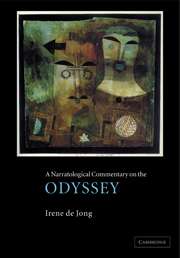Book contents
- Frontmatter
- Contents
- Preface
- Glossary
- Commentary
- Book One
- Book Two
- Book Three
- Book Four
- Book Five
- Book Six
- Book Seven
- Book Eight
- Book Nine
- Book Ten
- Book Eleven
- Book Twelve
- Book Thirteen
- Book Fourteen
- Book Fifteen
- Book Sixteen
- Book Seventeen
- Book Eighteen
- Book Nineteen
- Book Twenty
- Book Twenty-one
- Book Twenty-two
- Book Twenty-three
- Book Twenty-four
- Appendix A
- Appendix B
- Appendix C
- Appendix D
- Appendix E
- Appendix F
- Bibliography
- Index of Greek words
- Index of subjects
Book Fourteen
Published online by Cambridge University Press: 23 March 2010
- Frontmatter
- Contents
- Preface
- Glossary
- Commentary
- Book One
- Book Two
- Book Three
- Book Four
- Book Five
- Book Six
- Book Seven
- Book Eight
- Book Nine
- Book Ten
- Book Eleven
- Book Twelve
- Book Thirteen
- Book Fourteen
- Book Fifteen
- Book Sixteen
- Book Seventeen
- Book Eighteen
- Book Nineteen
- Book Twenty
- Book Twenty-one
- Book Twenty-two
- Book Twenty-three
- Book Twenty-four
- Appendix A
- Appendix B
- Appendix C
- Appendix D
- Appendix E
- Appendix F
- Bibliography
- Index of Greek words
- Index of subjects
Summary
Book 14 contains the remainder of the thirty-fifth day and the evening; cf. Appendix A. It begins the account of Odysseus' meeting with Eumaeus, which will be continued in Book 15. The plot function of this stay was indicated by Athena in 13.411–13: Odysseus is to question the swineherd about ‘everything’, i.e., the situation in the palace, and wait there until the arrival of Telemachus. But, as will be clear from its length, the meeting between ‘the stranger’ and the swineherd brings much more. A part from thematic and structural functions (see below), the main function of the Eumaeus episode is to create a foil for the ensuing encounter between Odysseus and the Suitors and disloyal servants: here we have an Ithacan who all these years has remained loyal to Odysseus and who treats ‘the beggar’ well.
Odysseus' meeting with Eumaeus is an instance of the *‘delayed recognition’ story-pattern: Odysseus does not reveal his true identity until Book 21. He has been instructed by Athena to remain incognito; cf. 13.397–403n. A hint as to why Odysseus keeps his identity hidden from his swineherd for so long, despite the latter's obvious loyalty, is given in 16.458–9 (he might not be able to keep the good news of Odysseus' return to himself and tell Penelope).
- Type
- Chapter
- Information
- A Narratological Commentary on the Odyssey , pp. 340 - 361Publisher: Cambridge University PressPrint publication year: 2001



